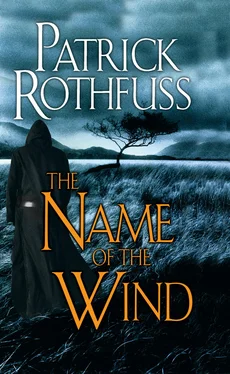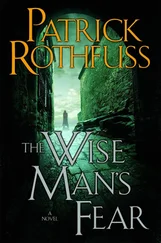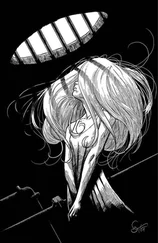I set out looking for drinking water. “Water comes first,” Laclith had told me. “Anything else you can do without for days.” I considered the lay of the land and followed some animal trails. By the time I found a small spring-fed pool nestled among some birch trees, I could see the sky purpling into dusk behind the trees. I was terribly thirsty, but caution won out and I took only a small drink.
Next I collected dry wood from the hollows of trees and under canopies. I set a simple snare. I hunted for and found several stalks of motherleaf and spread the sap onto my fingers where they were bloody and torn. The stinging helped distract me from remembering how I had hurt them.
Waiting for the sap to dry, I took my first casual look around. Oaks and birches crowded each other for space. Their trunks made patterns of alternating light and dark beneath the canopy of branches. A small rivulet ran from the pool across some rocks and away to the east. It may have been beautiful, but I didn’t notice. I couldn’t notice. To me the trees were shelter, the undergrowth a source of nourishment, and the pool reflecting moonlight only reminded me of my thirst.
There was also a great rectangular stone lying on its side near the pool. A few days earlier I would have recognized it as a greystone. Now I saw it as an efficient windbreak, something to put my back against as I slept.
Through the canopy I saw the stars were out. That meant it had been several hours since I had tried the water. Since it hadn’t made me sick, I decided it must be safe and took a long drink.
Rather than refreshing me, all my drink did was make me aware of how hungry I was. I sat on the stone by the edge of the pool. I stripped the leaves from the stalks of motherleaf and ate one. It was rough, papery, and bitter. I ate the rest, but it didn’t help. I took another drink of water, then lay down to sleep, not caring that the stone was cold and hard, or at least pretending not to care.
I awoke, took a drink, and went to check the snare I had set. I was surprised to find a rabbit already struggling against the cord. I took out my small knife and remembered how Laclith had shown me to dress a rabbit. Then I thought of the blood and how it would feel on my hands. I felt sick and vomited. I cut loose the rabbit and walked back to the pool.
I took another drink of water and sat on the stone. I felt a little lightheaded and wondered if it was from hunger.
After a moment my head cleared and I chided myself for my foolishness. I found some shelf fungus growing on a dead tree and ate it after washing it in the pool. It was gritty and tasted like dirt. I ate all I could find.
I set a new snare, one that would kill. Then, smelling rain in the air, I returned to the greystone to make a shelter for my lute.
CHAPTER NINETEEN
Fingers and Strings
In the beginning I was almost like an automaton, thoughtlessly performing the actions that would keep me alive.
I ate the second rabbit I caught, and the third. I found a patch of wild strawberries. I dug for roots. By the end of the fourth day, I had everything I needed to survive: a stone-lined fire pit, a shelter for my lute. I had even assembled a small stockpile of foodstuffs that I could fall back on in case of emergency.
I also had one thing I did not need: time. After I had taken care of immediate needs, I found I had nothing to do. I think this is when a small part of my mind started to slowly reawaken itself.
Make no mistake, I was not myself. At least I was not the same person I had been a span of days before. Everything I did I attended to with my whole mind, leaving no part of me free for remembering.
I grew thinner and more ragged. I slept in rain or sun, on soft grass, moist earth, or sharp stones with an intensity of indifference that only grief can promote. The only notice I took of my surroundings was when it rained, because then I could not bring out my lute to play, and that pained me.
Of course I played. It was my only solace.
By the end of the first month, my fingers had calluses hard as stones and I could play for hours upon hours. I played and played again all of the songs I knew from memory. Then I played the half-remembered songs as well, filling in the forgotten parts as best I could.
Eventually I could play from when I woke until the time I slept. I stopped playing the songs I knew and started inventing new ones. I had made up songs before; I had even helped my father compose a verse or two. But now I gave it my whole attention. Some of those songs have stayed with me to this day.
Soon after that I began playing . . . how can I describe it?
I began to play something other than songs. When the sun warms the grass and the breeze cools you, it feels a certain way. I would play until I got the feeling right. I would play until it sounded like Warm Grass and Cool Breeze.
I was only playing for myself, but I was a harsh audience. I remember spending nearly three whole days trying to capture Wind Turning a Leaf.
By the end of the second month, I could play things nearly as easily as I saw and felt them: Sun Setting Behind the Clouds, Bird Taking a Drink, Dew in the Bracken.
Somewhere in the third month I stopped looking outside and started looking inside for things to play. I learned to play Riding in the Wagon with Ben, Singing with Father by the Fire, Watching Shandi Dance, Grinding Leaves When it Is Nice Outside, Mother Smiling. . . .
Needless to say, playing these things hurt, but it was a hurt like tender fingers on lute strings. I bled a bit and hoped that I would callous soon.
Toward the end of summer, one of the strings broke, broke beyond repair. I spent the better part of the day in a mute stupor, unsure of what to do. My mind was still numb and mostly asleep. I focused with a dim shadow of my usual cleverness on my problem. After realizing that I could neither make a string nor acquire a new one, I sat back down and began to learn to play with only six strings.
In a span I was nearly as good with six strings as I had been with seven. Three span later I was trying to play Waiting While it Rains when a second string broke.
This time I didn’t hesitate, I stripped off the useless string and started to learn again.
It was midway through Reaping when the third string broke. After trying for nearly half a day, I realized that three broken strings were too many. So I packed a small dull knife, half a ball of string, and Ben’s book into a tattered canvas sack. Then I shouldered my father’s lute and began to walk.
I tried humming Snow Falling with the Late Autumn Leaves; Calloused Fingers and a Lute With Four Strings, but it wasn’t the same as playing it.
My plan was to find a road and follow it to a town. I had no idea how far I was from either, in which direction they might lie, or what their names might be. I knew I was somewhere in the southern Commonwealth, but the precise location was buried, tangled up with other memories that I was not eager to unearth.
The weather helped me make up my mind. Cool autumn was turning to winter’s chill. I knew the weather was warmer to the south. So, lacking any better plan, I set the sun on my left shoulder and tried to cover as much distance as I could.
The next span was an ordeal. The little food I’d brought with me was soon gone, and I had to stop and forage when I was hungry. Some days I couldn’t find water, and when I did I had nothing I could use to carry it. The small wagon track joined a bigger road, which joined a larger road yet. My feet chafed and blistered against the insides of my shoes. Some nights were bitter cold.
There were inns, but aside from the occasional drink I stole from horse troughs, I gave them a wide berth. There were a few small towns as well, but I needed someplace larger. Farmers have no need for lute strings.
Читать дальше











